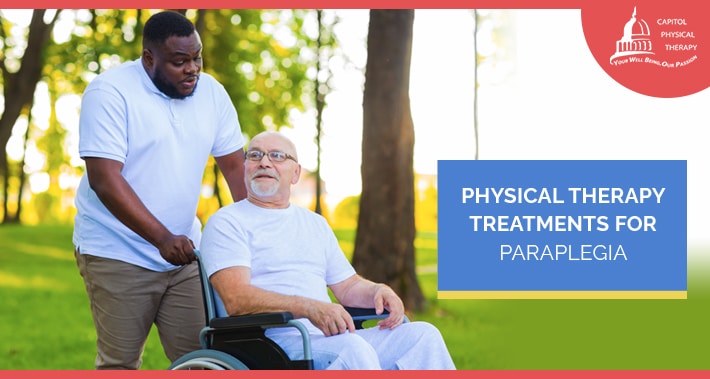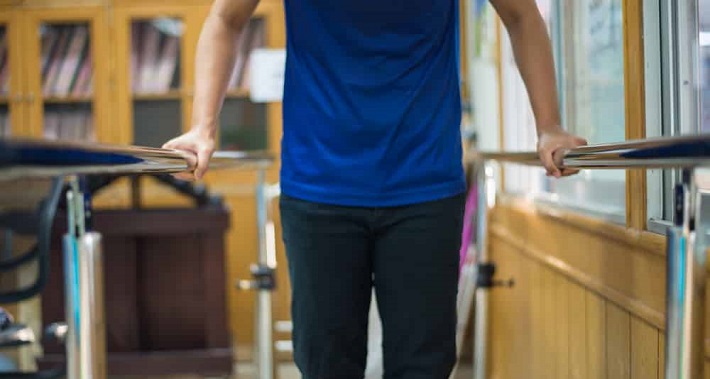
Approximately 1 in 50 Americans live with some form of paralysis.
In some cases, paralysis may be a temporary condition caused by illness or injury that improves with medical intervention.
Paraplegia, however, is a lifelong condition that can eventually lead to other issues, including:
- Overactive muscle responses (spasticity)
- Digestion difficulty
- Constipation and diarrhea
- Incontinence
- Muscle weakness
- Infections
Fortunately, there are treatment solutions.
At Capitol Physical Therapy, our physical therapy clinics provide solutions to help prevent these issues as well as improve your independence and overall wellbeing.
A diagnosis of paraplegia can be frightening and overwhelming, but you don’t have to do it alone.
We have experienced and caring physical therapists here to help you.
Below, we’ll take a closer look at how paraplegia works, and how physical therapy treatments for paraplegia can help.
What Is Paraplegia?
Different forms of paralysis are named for the areas of the body that they affect.
For instance, monoplegia is a form of paralysis which only affects a single limb, such as an arm or a leg.
On the other hand, quadriplegia affects both of your arms and legs.
Paraplegia is a permanent form of paralysis which affects the lower half of your body as well as your ability to walk.
It is typically diagnosed through imaging tests, such as MRI, x ray, and CT scan.
Paraplegia Symptoms
The most obvious symptom of paraplegia is an inability or difficulty moving your legs, feet, and stomach muscles.
In some cases, only one leg is paralyzed.
This form of paralysis is referred to as “incomplete paraplegia”.
Other symptoms of paraplegia can depend on the individual and the severity of the paralysis.
Additionally, some symptoms are present immediately while others develop over time.
Some general symptoms of paraplegia may include:
- Loss of feeling in the lower half of your body
- Chronic pain
- Phantom pain in lower half of your body
- Bladder and bowel difficulties
- Difficulty walking and standing
- Weight gain
- Depression
- Sexual dysfunction
- Skin issues
- Frequent infections
- High blood pressure
What Causes Paraplegia
Paraplegia may be caused by any illness or injury that impacts the part of the nervous system responsible for controlling the lower half of your body.
When this happens, your brain is no longer capable of sending signals to the lower half of your body, resulting in paralysis.
Injury related paraplegia is typically the result of spinal cord or brain damage.
Common causes of injury related paraplegia include car accidents, slip and fall accidents, sports and running injuries, and violent crime.
In other cases, spinal cord or brain damage may result from an illness or condition, such as:
- Cerebral palsy
- Some types of cancer
- Nerve conditions
- Multiple sclerosis
- Stroke
- Spinal tumors
- Brain tumors
- Hereditary spastic paraplegia, a rare genetic condition.
Additionally, researchers have identified several risk factors for developing paraplegia, including:
- Playing high impact sports, such as football or wrestling
- Participating in certain other sports, such as gymnastics, diving, or surfing
- A history of cancer
- A family history of neurological conditions

How Can Physical Therapy For Paraplegia Help
Physical therapists are movement experts.
That means we’re trained to help people living with paraplegia improve their lower body mobility.
This is typically done through repetitive, task specific exercises.
These exercises help to teach your spinal cord to adapt by rewiring and strengthening its neural pathways.
Let’s take a look at some common physical therapy exercises for individuals living with paraplegia.
1. Range Of Motion Exercises
Passive range of motion exercises help to prevent joint stiffness, promote circulation, and stimulate the spinal cord.
The exercises are referred to as “passive” because they require someone else to move your paralyzed limbs.
Alternatively, you may also use your arms to move your legs yourself during these exercises.
2. Muscle Strength Exercises
Paraplegia often causes your muscles to weaken due to lack of use.
Strengthening exercises can help you to regain and maintain some of this muscle mass.
Muscle strengthening exercises are especially important in helping prevent paraplegia related complications, such as:
- Severe injury from falls
- Muscle shrinkage (muscle atrophy)
- Fractures
- Poor circulation
- Decreased metabolic rate
3. Stretches
Individuals living with paraplegia often experience muscle spasticity.
Spasticity refers to involuntary muscle contractions caused by disrupted signals between your brain and muscles.
Your physical therapist can use stretching exercises to help reduce pain associated with spasticity.
Additionally, stretches can also help prevent exercises related injuries as well as improve your range of motion.
4. Gait Training
Gait training helps individuals living with paraplegia relearn how to walk.
It typically involves the aid of supportive devices such as parallel bars, walkers, and weight bearing equipment.
Your physical therapist will focus on developing coordination and strength in your legs as well as target your core to improve balance and stability.
Special attention will also be paid to safety during upright mobility.
Some individuals require the help of a harness during gait training to maintain balance.
Ultimately, gait training will help strengthen your legs and help you to gradually be able to bear more weight on your hips, knees, and ankles.
Book Your Appointment With Capitol Physical Therapy Today
If you’ve been diagnosed with paraplegia, don’t wait to begin physical therapy.
Physical therapy can’t guarantee complete recovery from paraplegia, but it can help to minimize your risk of stiffness, muscle atrophy, and poor circulation.
At Capitol Physical Therapy, we want to help you manage your paraplegia related symptoms.
Book your appointment with Capitol Physical Therapy today – we’re here to help.
1331 H St NW #200,
Washington, DC 20005
- https://g.page/capitolptdc
9560 Pennsylvania Ave. # 202,
Upper Marlboro, MD 20772
- https://goo.gl/maps/zjL4NnnuThRhrcS86
Capitol Physical Therapy offers orthopedic and other pain related solutions, with our versitile team of physical therapists in Washington, DC